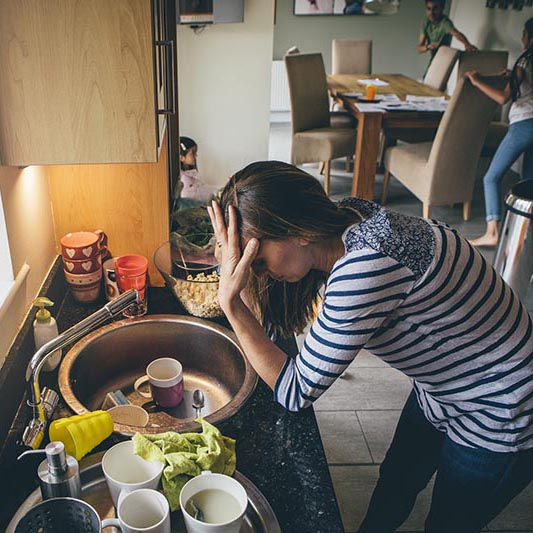
How’s it going?” I asked my friend Katie when we crossed paths at the school our children attend.
“Great,” she responded with an eyeroll. “Sorry, but I can’t stop to talk. I just finished volunteering for Jenna’s class party, and now I need to get Josh to his orthodontist appointment. Then back home to help both kids finish their science fair projects while trying to get ready for my sister-in-law’s baby shower at my house this weekend. I hope I get enough time to prepare for my big sales pitch tomorrow morning! Oh, and we need to talk about signing the kids up for soccer camp this summer—Jenna only wants to go if your daughter goes too! Talk later?”
The names in this story have been changed to protect the innocent, but in reality she could be any one of my friends, co-workers, or family. Burnout is a real thing happening to a lot of us – as many as one in five moms!
The phenomenon is called maternal burnout and it’s defined as exhaustion when the burden of stress exceeds personal resources to cope with it. Earlier this year, the World Health Organization made it an official medical diagnosis, noting symptoms of energy depletion or exhaustion; increased mental distance or feelings of negativity or cynicism related to one’s job; and reduced professional efficacy.
There are many contributing factors to mom burnout, but here are three of the most common stressors and some suggestions on how to best address them.
1. Put ‘me time’ on the to-do list
Parenthood gives us “the most challenging tasks that adults face in their lives, often without any support, or preparation.” Parenting of course involves a physical workload, but also a mental one. Mothers often shoulder the brunt of the mental load, or what researchers have coined “worry work.”
That mental list running through Katie’s mind is a perfect example of the burden many mothers share: an endless list of to-do items hanging over our heads. No offense dads, but compared to working fathers, working mothers are three times as likely to be managing children’s schedules, three times more likely to volunteer at school, and nearly twice as likely to make sure all family responsibilities are handled.
I know this is hard moms, but you NEED to take time to rest and take care of yourself. We are always worrying about everyone else’s needs, so we often forget about our own. Can you figure out a recurring block of time for ‘me time’? Get a massage, go for a long run, read a fun book, or meditate. Taking this time to recharge yourself will make you a better parent in the long run.
2. Strive for good, not perfect
One analysis of burnout among mothers found a strong theme of fear, typically the fear of not being a good enough mother. This fear often stems from a great sense of duty, combined with high demands of themselves.
The perfect mother does not exist. That seems like an obvious statement, but being “supermom” is the impossible goal that many mothers strive for. I received a gift at my first son’s baby shower that said “There is no way to be a perfect mother, but a million ways to be a good one”. I have that phrase hanging in my house today as a constant reminder.
Here are a few ways to be a GOOD mom: Experts have recommended focusing on doing things with your children, as opposed to doing things for them. A potential way to help address this is to empower your children to do more. For example, give your kids chores they can manage, or assign them tasks for helping to make dinner. Increasing their duties as appropriate by age not only takes a bit off your plate, but also helps teach them the value of work and responsibility.
3. Rely on your village
Burnout results from having more stressors than we do resources to alleviate or cope with that stress. Examples of such stress-inducing factors are parental perfectionism, countless parental duties and chores, lack of support from the co-parent, and lack of external support (support from family, childcare providers, babysitters, etc.).
We’ve all heard the phrase “It takes a village to raise a child” and this proverb hits home for me. You can’t do everything yourself, it’s OK to ask for help—even to those that may not be volunteering help. Have a frank discussion with your partner about the parenting duties each person can reasonably handle. Utilize paid help as much as your budget will allow. Ask friends or parents for specific things they can do to help take the load off you. Consider having a “kid swap” with a neighbor: you watch all of the kids one night, then they take them all another night so you can have some free time. Or find a gym that has child care while you work out and relieve some stress.
This short list is certainly not exhaustive of all the factors that contribute to maternal burnout, but we hope it helped identify a few common causes and offered some solutions that may work for you.
You may feel like balance is unachievable while being pulled in all directions, but you are doing great. Recognize just how much you are managing, make the small changes you can, and be kind to yourself.

By Krista Dusil
CFO, Sanvello
Krista is the mother to two amazing kids, Landon (11) and Savannah (8) and is constantly working on achieving the balance it takes to be a working mom. Krista leads finance and human resources for Sanvello and has held previous roles in in finance, product, operations, and international over her 17+ year career at UHG. She earned a BA in accounting from the University of St. Thomas in St. Paul, MN.
